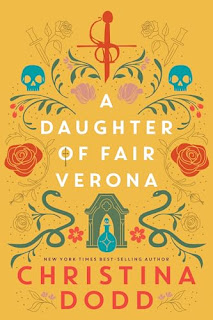Synopsis: Once upon a time a young couple met and fell in love. You probably know that story, and how it ended ( badly). Only here’s the That’s not how it ended at all.
Romeo and Juliet are alive and well and the parents of seven kids. I’m the oldest, with the emphasis on ‘old’—a certified spinster at twenty, and happy to stay that way. It’s not easy to keep your taste for romance with parents like mine. Picture it—constant monologues, passionate declarations, fighting, making up, making out . . . it’s exhausting.
Each time they’ve presented me with a betrothal, I’ve set out to find the groom-to-be a more suitable bride. After all, someone sensible needs to stay home and manage this household. But their latest match, Duke Stephano, isn’t so easy to palm off on anyone else. The debaucher has had three previous wives—all of whom met unfortunate ends. Conscience forbids me from consigning another woman to that fate. As it turns out, I don’t have to . . .
At our betrothal ball—where, quite by accident, I meet a beautiful young man who makes me wonder if perhaps there is something to love at first sight—I stumble upon Duke Stephano with a dagger in his chest. But who killed him? His late wives’ families, his relatives, his mistress, his servants—half of Verona had motive. And when everyone around the Duke begins dying, disappearing, or descending into madness, I know I must uncover the killer . . . before death lies on me like an untimely frost.
Knives Out meets Bridgerton in Fair Verona, as New York Times bestselling author Christina Dodd kicks off a frothy, irreverent, witty new series with an irresistible premise—Romeo and Juliet’s daughter as a clever, rebellious, fiercely independent young woman in fair Verona—told from the delightfully engaging point of view of the captivating Rosie Montague herself…
~ ~ ~
I loved this rom-com set in the time of Shakespeare's "Romeo and Juliet" - Verona in the early Renaissance period. Our narrator and heroine is Rosie Montague - daughter of said Romeo and Juliet - who now finds herself in yet another unenviable position - yet another betrothal of marriage - and one she cannot (and will not) foister on an unsuspecting potential bride (Rosie is in the habit of playing matching maker for any potential or impending suitors put forward by her parents). This suitor is suitably unsuitable ....
"... he had said he wanted me for power and revenge -power over me, I assume, but revenge? on whom? ..."
On the day of the official betrothal, Rosie suddenly finds herself enamoured by another (a gate-crasher); her betrothed - Duke Leir Stephano - cruelly murdered; and herself the prime suspect. But Rosie is no ordinary fair maid - she is intelligent, independent, obstinate, and determined to find out who killed her betrothed if only to clear her name .. not so easy when the body count is rising.
This is a very enjoyable read - the chapters are short and concise, filled with compelling and humourous dialogue, narrated by a self-deprecating heroine, peppered with themes found in many a Shakespearean tome - jealousy, greed, envy, revenge, hatred, love and ... mean girls!
I believe this to be the first in a new series - so am eagerly awaiting what fate - and author Dodd - have in store for Rosie Montague.
For the reader worried that author Dodd has taken liberties with two of Shakespeare's own characters, fear not, the Bard himself was an habitual "borrower" of other peoples' stories. A keen reader may discern that in this instance, the Bard borrowed from a poem by Arthur Brooke who himself borrowed the plot from a story by Matteo Bandello.



